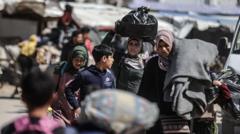The International Committee of the Red Cross (ICRC) has described the humanitarian situation in Gaza as “hell on earth,” following the continuation of Israeli military actions that have led to the deaths of over 1,500 people and the displacement of nearly 400,000. Mirjana Spoljaric, the head of the ICRC, emphasized the erosion of international law in a statement to the BBC. The organization, typically discreet in its comments, expressed that the conditions faced by civilians in Gaza now threaten their very existence.
Gaza: Red Cross Chief Declares Region a 'Hell on Earth' Amid Ongoing Conflict

Gaza: Red Cross Chief Declares Region a 'Hell on Earth' Amid Ongoing Conflict
Mirjana Spoljaric, head of the ICRC, issues a stark warning on the humanitarian crisis in Gaza as the Israeli military continues its assault.
Spoljaric's comments coincided with alarming assessments from the UN human rights office, which criticizes Israel for tactics that seem to defy the Geneva Conventions on the treatment of civilians during conflict. Since hostilities renewed on March 18, casualties have surged, with the Hamas-run health ministry reporting significant deaths. Furthermore, the Israeli government has imposed a blockade, denying essential supplies to the region since early March.
Despite claims by Israeli authorities asserting adherence to international law, they acknowledge that operations against Hamas, often embedded among civilians, inadvertently result in collateral damage. However, Spoljaric firmly stated that no party in the conflict can escape accountability for alleged war crimes, urging for an immediate ceasefire and a restoration of humanitarian conditions.
The UN has voiced concerns over what it views as a deteriorating human rights landscape for Gazans, with calls for urgent action from the international community to uphold humanitarian norms. Spoljaric highlighted the growing “dehumanisation” associated with warfare, emphasizing the need for compliance with international laws to prevent the repetition of historical atrocities.
As calls for accountability and humanitarian relief grow louder, the situation in Gaza is increasingly viewed as one of existential threat, reminding the world of the critical need for adherence to humanitarian principles even amidst escalating conflicts. Both Palestinian civilians and Israeli hostages remain caught in the crossfire of a protracted struggle, with hopes for peace seemingly distant.
Despite claims by Israeli authorities asserting adherence to international law, they acknowledge that operations against Hamas, often embedded among civilians, inadvertently result in collateral damage. However, Spoljaric firmly stated that no party in the conflict can escape accountability for alleged war crimes, urging for an immediate ceasefire and a restoration of humanitarian conditions.
The UN has voiced concerns over what it views as a deteriorating human rights landscape for Gazans, with calls for urgent action from the international community to uphold humanitarian norms. Spoljaric highlighted the growing “dehumanisation” associated with warfare, emphasizing the need for compliance with international laws to prevent the repetition of historical atrocities.
As calls for accountability and humanitarian relief grow louder, the situation in Gaza is increasingly viewed as one of existential threat, reminding the world of the critical need for adherence to humanitarian principles even amidst escalating conflicts. Both Palestinian civilians and Israeli hostages remain caught in the crossfire of a protracted struggle, with hopes for peace seemingly distant.


















